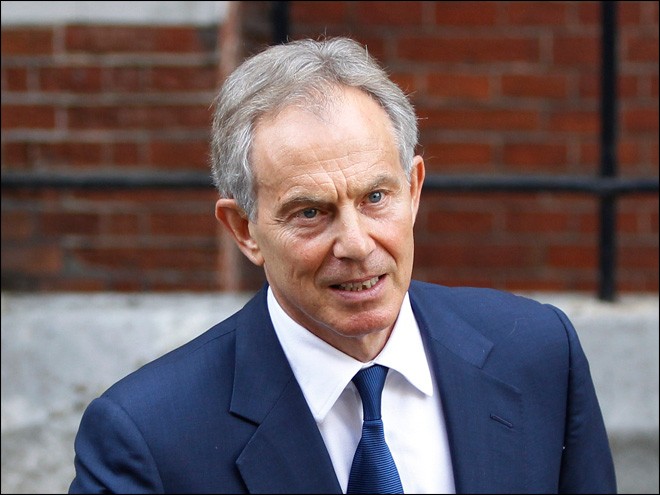Tony Blair yesterday delivered one of his most important speeches since ceasing to be British Prime Minister. Speaking on the Middle East and North Africa, he said the greatest threat of our time is Islamic extremism, and called on world powers to put aside their difference to defeat it.
He also called for great understanding of the differences between moderate Islam and version adopted by jihadists, and listed examples of how we can help particular countries.
He began his 45-minute speech by listing four reasons ‘why the Middle East matters’: it generates a large part of the world’s energy supplies, it is on the doorstep of Europe, it is where the state of Israel – a key US ally – is located, and it will ultimately decide the future of Islam.
Mr Blair said that the struggle in the Middle East is between “those with a modern view of the Middle East, one of pluralistic societies and open economies, where the attitudes and patterns of globalisation are embraced; and, on the other side, those who want to impose an ideology born out of a belief that there is one proper religion and one proper view of it, and that this view should, exclusively, determine the nature of society and the political economy.”
He said that the latter view is the Islamist view, and that this is the main struggle throughout the Middle East, “from Iraq to Libya to Egypt to Yemen to Lebanon to Syria and then further afield to Iran, Pakistan and Afghanistan”
He also added that although the struggle is the relationship between Islam and politics, we should not confuse this with religiosity.
“Many of those totally opposed to the Islamist ideology are absolutely devout Muslims. In fact it is often the most devout who take most exception to what they regard as the distortion of their faith by those who claim to be ardent Muslims whilst acting in a manner wholly in contradiction to the proper teaching of the Koran,” the former Prime Minister said.
This struggle is crucial because the Middle East is still the centre for Islamic thought and theology, and the ideology can be exported around the world. Islamists around the world import their ideas from the Middle East.
With the exception of Latin America, there is not a region in the world that is not affected by Islamism. Extremism is now the biggest challenge to the development of some sub-Saharan African countries, for example. It is also spreading to central Asia, in particular Russia, and reaching the Chinese province of Xinjiang.
Mr Blair then went on to criticise commentators who say that attacks by Islamist extremists are not really due to Islam but local, specific factors: “It is bizarre to ignore the fact the principal actors in all situations, express themselves through the medium of religious identity or that in ideological terms, there is a powerful unifying factor based on a particular world view of religion and its place in politics and society.”
He also said that a failure to properly comprehend the Islamist ideology has complicated Western intervention in Middle Eastern countries. He said that the battle between the Islamists and the modernisers explains why Libya and Syria are now in chaos and why Iraq and Afghanistan have “proved immensely difficult and bloody.”
Blair said that the West has to take sides in this struggle, even if it means making friends with secular dictators and absolute monarchs.
He gave some specific examples. In Egypt, he said, it is right for us to support the overthrow of the Muslim Brotherhood and help the new government evolve towards a more open, pluralistic democracy.
In the case of Syria, Blair said the continuation of the Assad regime is now the least bad option, albeit temporarily.
In Tunisia, we should support the new government in its bid to build a secular state.
In Libya, NATO should not be afraid to offer assistance to the new government in stabilising the country, as it will affect the whole of northern Africa if it collapses.
In Yemen, we should help the government with development and security sector reform.
In Iran, we should make it clear that they must not become a nuclear power. Although we cannot offer regime change there, we can help ordinary Iranians find their own may to end the Islamic theocracy.
In Israel and Palestine, we should make sure that peace happens – not because it would solve all the problems in the Middle East, but because it would be a huge symbolic victory for the forces we support.
Mr Blair finished by saying that we must work with Eastern nations, such as Russia and China, to defeat Islamism. All nations in the G20 have a common aim in defeating Islamic extremism, so they should all work together on this issue, he said. They could, for example, create an education programme to eliminate extremism from schools.
In his closing remarks, Mr Blair said that although this is not a conventional conflict, we must still fight, as it is a battle for our values:
“This is not a conventional war. It isn’t a struggle between super powers or over territory. But it is real. It is fearsome in its impact. It is growing in its reach. It is a battle about belief and about modernity.”
“Engagement does not always mean military involvement. Commitment does not mean going it alone. But it does mean stirring ourselves. It does mean seeing the struggle for what it is. It does mean taking a side and sticking with it.”

COMMENTS
Please let us know if you're having issues with commenting.